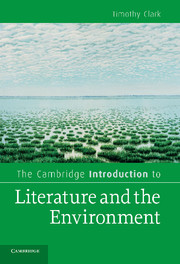Book contents
- Frontmatter
- Contents
- List of illustrations
- Preface
- Acknowledgements
- Introduction
- Romantic and anti-romantic
- Chapter 1 Old world romanticism
- Chapter 2 New world romanticism
- Chapter 3 Genre and the question of non-fiction
- Chapter 4 Language beyond the human?
- Chapter 5 The inherent violence of western thought?
- Chapter 6 Post-humanism and the ‘end of nature’?
- The boundaries of the political
- Science and the struggle for intellectual authority
- The animal mirror
- Notes
- Further reading
- Index
- Cambridge Introductions to …
Chapter 2 - New world romanticism
Published online by Cambridge University Press: 05 June 2012
- Frontmatter
- Contents
- List of illustrations
- Preface
- Acknowledgements
- Introduction
- Romantic and anti-romantic
- Chapter 1 Old world romanticism
- Chapter 2 New world romanticism
- Chapter 3 Genre and the question of non-fiction
- Chapter 4 Language beyond the human?
- Chapter 5 The inherent violence of western thought?
- Chapter 6 Post-humanism and the ‘end of nature’?
- The boundaries of the political
- Science and the struggle for intellectual authority
- The animal mirror
- Notes
- Further reading
- Index
- Cambridge Introductions to …
Summary
More than with revisionist readings of British Romanticism, ecocriticism as a recognisable school emerged mainly with the study of a distinctive American tradition of non-fictional writing focussed on ideas of the wild, writers such as Henry D. Thoreau, Mary Austin, John Muir, Wendell Berry, Edward Abbey and Annie Dillard. At issue is a tradition of thought that may also be traced through the founding of Yosemite and Yellowstone national parks and into such continuing forces as the Sierra Club and the Nature Conservancy. Even to this day, as the environment has become an urgent public issue, much environmental literary criticism reads as modes of thinking from this broadly romantic tradition working to transform themselves in the face of questions beyond their initial scope.
A fascination with the wild as the acultural or even anti-cultural pervades much environmental non-fiction. ‘Wild’ nature necessarily offers a space outside given cultural identities and modes of thinking or practice. Gretel Ehrlich's essays on Wyoming, The Solace of Open Spaces, memorably quote a ranch hand saying, ‘It's all a bunch of nothing – wind and rattlesnakes – and so much of it you can't tell where you're going or where you've been and it don't make much difference.’ Throughout history, places such as deserts or forests have been conceived as sites of identity crisis and metamorphosis, as the domains of the monstrous and terrifying, places of religious insight or of rites of passage, as in the biblical ‘wilderness’.
- Type
- Chapter
- Information
- Publisher: Cambridge University PressPrint publication year: 2011



